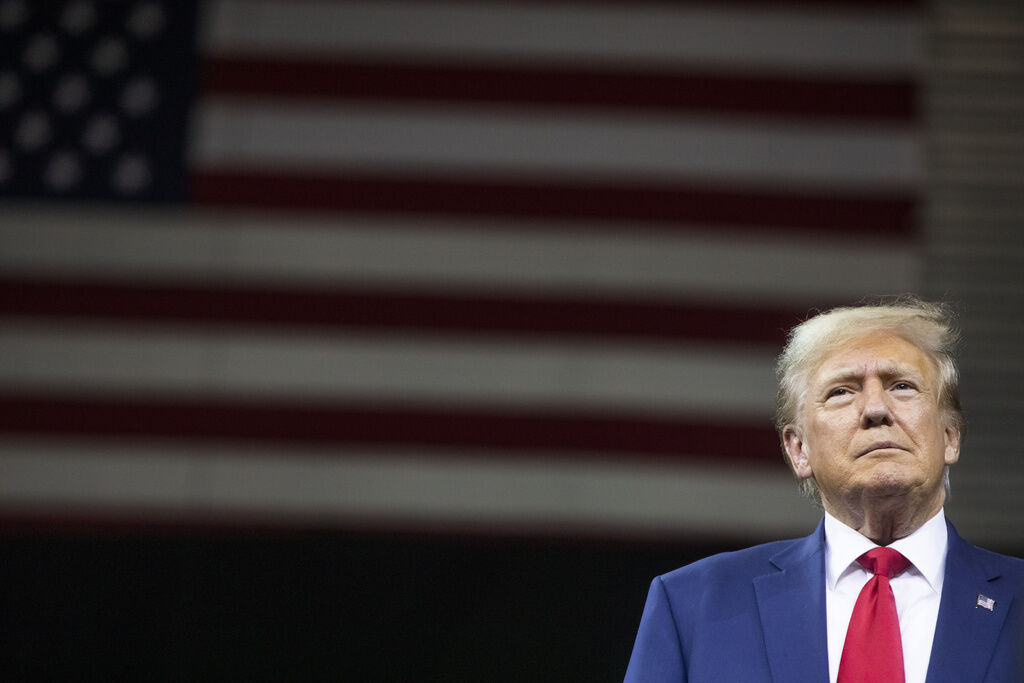Democratic Gov. Katie Hobbs says neither she, nor any other Arizona official, has the unilateral right to keep Donald Trump off the ballot for the state’s presidential preference primary based on the 14th Amendment.
That’s also the view of Republican state Sen. Ken Bennett, who served six years as secretary of state, Arizona’s chief election officer.
But Democrat Adrian Fontes, the current secretary of state, hasn’t reached a conclusion yet on whether he can decide Trump’s actions in and around Jan. 6, 2021 violate the 14th Amendment. That post-Civil War amendment bars anyone who has “engaged in insurrection or rebellion’’ against the government from holding federal office.
Fontes is actively seeking legal advice, his press aide said Thursday.
The secretary of state’s counterparts in other states have said they’re also looking for guidance.
Fontes has some time. The earliest anyone seeking to get on Arizona’s March 19 presidential preference ballot can file the necessary paperwork is Nov. 10, with a deadline of Dec. 11. Fontes must decide by Dec. 14 whose name can be on the ballot.
Hobbs, who was secretary of state until becoming governor in January, said Thursday she doesn’t see any wiggle room. “It is not up to any elected official to get involved in that,’’ she said. “It’s up to the courts.’’
She said she won’t seek judicial intervention. “I’m not going to be a part of that,’’ Hobbs said.
Bennett said the secretary of state does have some authority over ballot status. “There are things you can do in Arizona that can keep you off the ballot,’’ he said.
There is a form that those seeking ballot status in Arizona must fill out, asking would-be candidates whether they meet the three criteria outlined in the U.S. Constitution, he said.
“You have to be 35 years of age, you have to have lived in the country for 14 years, and be a natural-born citizen,’’ Bennett said. “If you don’t check those three boxes and you don’t attest with your signature that you meet those qualifications, you shouldn’t be on the ballot.’’
Asked if there’s anything else, he answered: “Not for the reasons of January 6th.”
He said that’s especially true given that Trump has not been convicted of anything related to the events leading up to and during the riot where the former president’s supporters sought to halt the counting of the electoral votes in an unsuccessful bid to keep Trump in office and deny Joe Biden his election victory.
“Just to hypothesize that he might be off the ballot because of what happened on January 6th I think is completely inappropriate,’’ Bennett said.
Bennett has some history in this area of what a secretary of state can — and cannot — do in determining the qualifications of presidential contenders. He said he discovered in 2012 that Democrat Barack Obama, seeking reelection, had not checked the three boxes on the state form when he first ran in 2008.
“I was shocked,’’ he said.
The problem was resolved when Obama’s campaign provided a signed form, he said.
Yet Bennett caused headlines when he asked the state of Hawaii to provide certification that it had a birth certificate on file for Obama. He said Thursday, however, that had nothing to do with whether Obama’s name was going to be on the ballot.
“I basically requested that document because I had people, mostly a lot of Republicans, saying ‘We don’t believe he was born in Hawaii,’ ‘’ Bennett said.
The actual birth certificate was not subject to disclosure. But Bennett said he was informed there was a statute in Hawaii that allows election officials from other states to get “this certain certification in lieu of a birth certificate.’’
“So I simply did that to prove to people who were contacting my office saying, daily, ‘What are you going to do to make sure that he was really eligible to run for president?’ ‘’ he said.
That involved getting a $5 money order, filling it out, and sending it to Hawaii. Bennett said he got verification that Obama was born on Aug. 4, 1961 in Honolulu, with the names of his parents and the hospital of his birth.
But Bennett said it would not have mattered — at least to him for the purposes of the 2012 presidential primary — if he never got the document about Obama.
“If he filled out the form that Arizona produces and checked those three boxes and signed the form, he would have been on the ballot,’’ he said.





